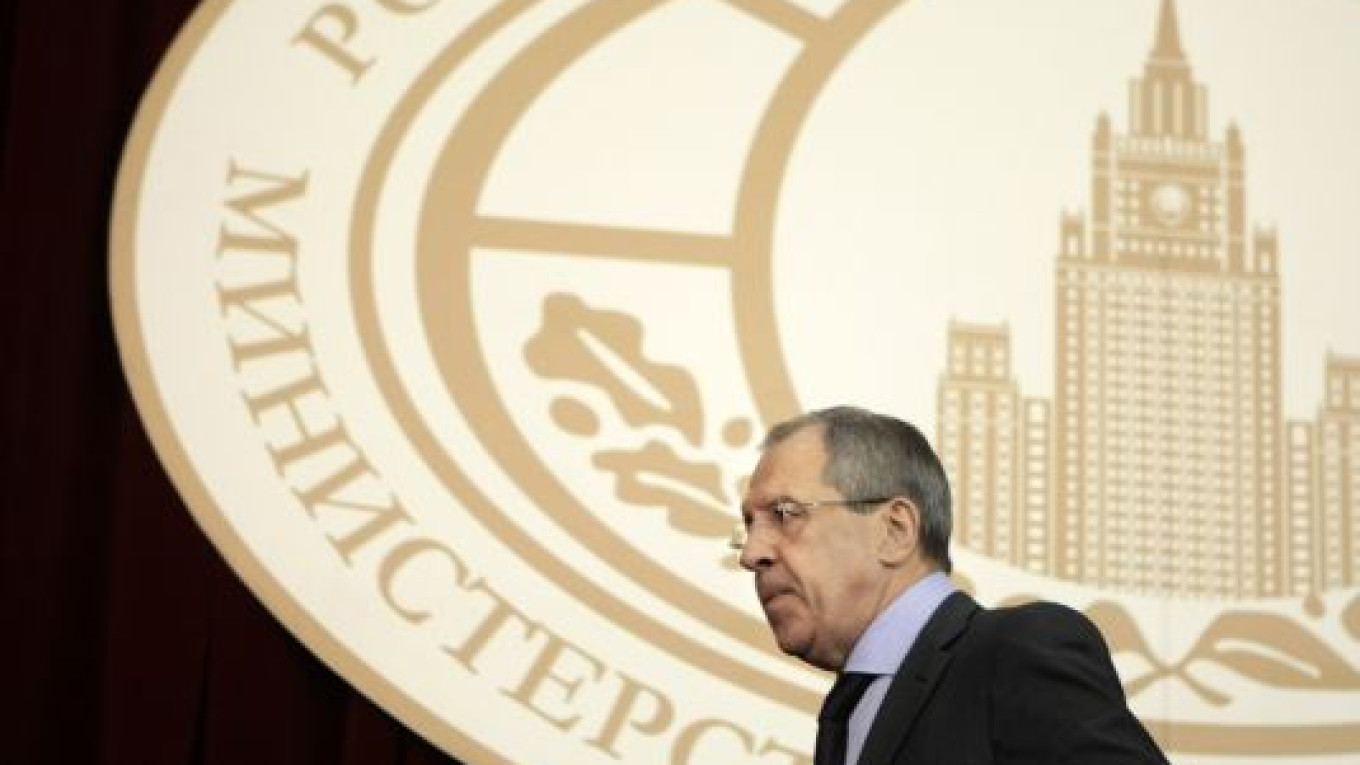President Dmitry Medvedev's proposal for a new security pact sets a litmus test for the honesty of the West versus Moscow, Foreign Minister Sergei Lavrov said Friday.
The lukewarm reception of the pact by Western leaders can only be explained by an unwillingness to live up to earlier promises of a united Europe, Lavrov told reporters at his annual news conference in the Foreign Ministry.
If NATO believes that the privilege of indivisible security only counts for its members, "all assertions and promises that there will be no more dividing lines in Europe were false," Lavrov said.
NATO Secretary-General Anders Fogh Rasmussen said last month that the pact was not needed because sufficient legal documents had been signed to regulate security ties with Moscow.
But Lavrov argued that the treaty was necessary to implement declarations made in the 1990s that "we are all friends, security is indivisible and nobody’s security can be enhanced at the cost of others."
Moscow has bristled at NATO’s expansion eastward into former Soviet territories, and ties with the alliance dipped to a post-Cold War low after the 2008 short war with Georgia, another NATO hopeful.
Lavrov also expressed frustration at Poland's plans to station a U.S. Patriot missile battery near the Russian border. "If this is true, the question arises why it is necessary to do something that looks like Poland is bracing itself against Russia. I do not understand this," he said.
The Polish Defense Ministry said last week that a Patriot base manned by some 100 U.S. troops would be installed 60 kilometers from the border with the Kaliningrad exclave.
The announcement was followed by national media reports that Russia would beef up its fleet in the Baltic Sea, but this was denied by the Defense Ministry.
Lavrov reiterated Moscow’s position on sanctions against Iran, arguing that it would be wrong to push Tehran into a corner. “If our logic is to punish Iran … this will not be a sober approach,” he said, adding that sanctions could risk the work of international inspectors in Iran.
Moscow has watered down previous U.S.-led drives for sanctions against Iran, which is accused by the West of developing nuclear weapons.
Yet Lavrov said he was unhappy with Tehran’s dismissal of a UN-brokered proposal to send uranium for a research reactor abroad for processing.
Lavrov also said he hoped that a replacement for the landmark START nuclear arms reduction treaty with the United States would be clinched soon after talks resume early next month.
"The remaining questions, I hope, will be resolved rather promptly when the negotiations resume, and they will resume at the very beginning of February, I think," he said.
Lavrov’s comments represented Moscow’s strongest public statement yet on the issue after negotiators failed to reach a deal before Dec. 5, when START I expired.
Last week, U.S. National Security Adviser James Jones and the chairman of the Joint Chiefs of Staff, Mike Mullen, had two days of closed-door talks with a Russian team led by Nikolai Makarov, a deputy defense minister and chief of the armed forces’ General Staff.
Both sides agreed that negotiations should resume in Geneva in February.
On a more lighthearted note, Lavrov said he liked the new "Mult Lichnosti" cartoon show, despite the fact that he is prominent among those parodied on the program.
"Not everything is unambiguous, but there are really good elements in it. I think that is useful," he said.
The program, which has been shown on state-controlled Channel One television since the New Year, features a bureaucratic Lavrov who dryly fends off the amorous advances of his U.S. counterpart, Hillary Clinton.
Lavrov said he would not comment on how much he thought that the satirical character resembled him. "This is not for me to judge,” he said.
A Message from The Moscow Times:
Dear readers,
We are facing unprecedented challenges. Russia's Prosecutor General's Office has designated The Moscow Times as an "undesirable" organization, criminalizing our work and putting our staff at risk of prosecution. This follows our earlier unjust labeling as a "foreign agent."
These actions are direct attempts to silence independent journalism in Russia. The authorities claim our work "discredits the decisions of the Russian leadership." We see things differently: we strive to provide accurate, unbiased reporting on Russia.
We, the journalists of The Moscow Times, refuse to be silenced. But to continue our work, we need your help.
Your support, no matter how small, makes a world of difference. If you can, please support us monthly starting from just $2. It's quick to set up, and every contribution makes a significant impact.
By supporting The Moscow Times, you're defending open, independent journalism in the face of repression. Thank you for standing with us.
Remind me later.


